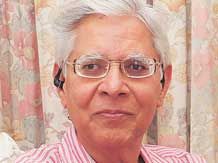 P C Parakh had raised objections to the screening committee route during his tenure as coal secretary from March 2004 to December 2005.
P C Parakh had raised objections to the screening committee route during his tenure as coal secretary from March 2004 to December 2005.
The author of Crusader or conspirator? Coalgate and other truths courted controversy last year when he said Manmohan Singh, then prime minister, was ‘conspirator number three’ in the alleged favours to Hindalco.
In an interview on Monday with Business Standard, he says the central government did not have legal sanction to allocate coal blocks.
Edited excerpts:
Has your stand on the allocation process been vindicated by the SC order?
I feel completely vindicated, for if the government had agreed to my suggestions on amending the law and procedures, this would not have happened.
It is a fallout of not adhering to the advice I’d given.
The court has held the government did not have any legal sanction under any law and, therefore, all the allocations are illegal.
How was the screening committee route flawed?
Set up by the government, it did not have the right to allot blocks.
Therefore, they are illegal.
In 2004, I told the government, we must amend the Coal Mining Nationalisation Act to give authority to the government to make allocation through bidding.
The defence was that state governments were opposing introduction of the bidding route and a delay would have created problems of coal supply. Do you think these were genuine reasons?
In my book, I have provided a detailed account of what happened. They are good excuses but not logical.
In the changes we had suggested in the Act, we did not oppose the role of state governments.
Under the screening committee route, the state governments screen applications to determine whether these are bona fide.
That piece of inquiry would have remained. Ultimately, the state governments will give mining leases.
We were not opposing any change in the state government role.
But weren’t the states opposed to bidding?
I would say there was not enough political will to pressure the states to agree.
Do you think terming the entire coal block allocation since 1993 as illegal could create problems for the industry?
The saving grace is the SC did not cancel allocations but kept a window open and has not resorted to wholesale cancellation as they did in the 2G (telecom spectrum) case.
Otherwise, there will be a serious problem of coal supply. It has taken a practical view.
What should be done in the event of de-allocation of coal blocks? What should be the way forward till the bidding process is completed?
Today’s order is not clear on de-allocation but it could happen in cases of misrepresentation or where people have sold off.
Companies which come out clear will be able to proceed further and start mining.
The court has also said coal meant for UMPPs should not be used for commercial purposes. What are your views?
It is difficult to say whether it is right.
Whether a block allocated to one project could be used for another.
Rationally speaking, it looks reasonable that companies are encouraged to use indigenous coal instead of importing.
But, it is in contravention of the policy because it (the latter) envisages coal is used in the project for which it is allotted.
A decision should be in the overall interest of the economy and people.
Image: PC Parakh; Photograph Courtesy: Business Standard










 © 2025
© 2025